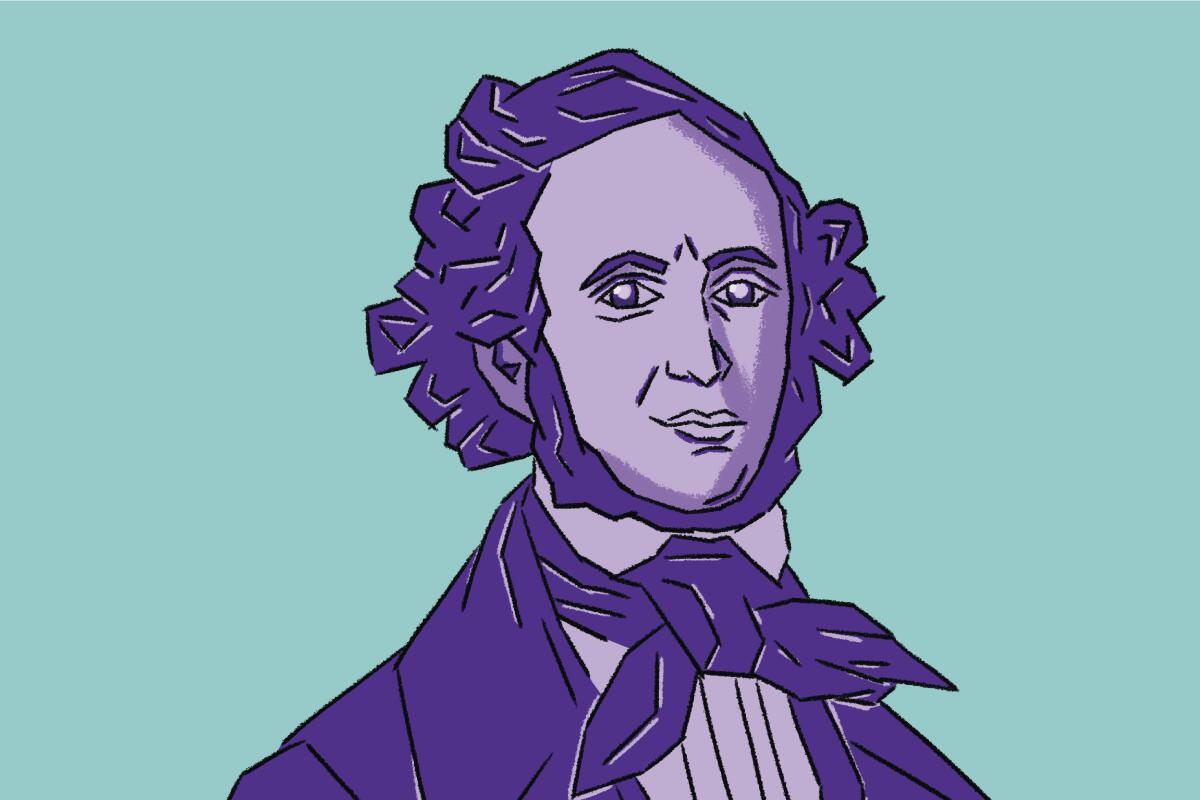Mendelssohn: Ah, youth! The sheer pleasure of music that gives us hope

- Share via
Listen to the opening of Felix Mendelssohn’s Octet, as played by Jascha Heifetz, Gregor Piatigorsky and friends on the irresistible recording they made in 1961 at the old Elvis-haunted RCA studios near Hollywood and Vine. Mendelssohn was 16 when he produced this truest embodiment of unbridled, anything-is-possible youth. Unlike a document — film, painting, photograph, printed or even spoken word — it is neither youth preserved nor mimicked but, in each performance, youth reborn.
Goethe encountered both Mozart and Mendelssohn as boys and had this to say to the latter’s teacher: “What your pupil already accomplishes, bears the same relation to the Mozart of that time that the cultivated talk of a grown-up person bears to the prattle of a child.”
The Octet has got to be the most impressive work of art ever produced by anyone so young. It’s not just its verve but its voice that is so remarkable. The depth of feeling, the humanity, the craftsmanship, the sheer giving of pleasure are all pure Mendelssohn, already there. This is the immediately recognizable, immediately lovable Mendelssohn of the Overture to “A Midsummer Night’s Dream,” the Violin Concerto and the “Scottish” and “Italian” Symphonies.
Above all, the Octet remains a manifest proclamation of youth and, hence, hope. If a 16-year-old could do this nearly 200 years ago, what might our youth now augur?
Indeed, Mendelssohn’s unsullied exultation led to one of the great and influential careers in music. The Octet was written in 1825, and the composer went on, until his death only 22 years later, to become perhaps the leading musician of the second quarter of the 19th century. In addition to being a famed composer, he was said to be an amazing pianist, violinist and violist who also invented modern conducting and turned Leipzig’s Gewandhaus into a legendary German orchestra.
He was handsome. He was a talented painter and gymnast. He was a loving son, brother, husband and father. He was doted upon by royalty and generously used his influence and power to support other composers. He was a humanist who idealistically made ecumenicalism the spiritual and societal center of his life.
Yet he became hated. Shortly after his death, Mendelssohn was attacked for being a Jew by an insanely jealous Richard Wagner and discredited by progressives for being a conservative. He was canceled by the Nazis and dismissed by Modernists who thought him sentimental and superficial.
George Bernard Shaw complained of Mendelssohn’s “despicable oratorio mongering.” In his otherwise probing “The Romantic Generation,” Charles Rosen sniffily titled his chapter on the composer “Mendelssohn and the Invention of Religious Kitsch.” A withering Ludwig Wittgenstein reduced Mendelssohn to “a man who is jolly when the people he is with are jolly anyway.”
Although concerted scholarly efforts over the last half century have aimed to provide context to Mendelssohn’s career and restore his reputation, Mendelssohn might today seem the poster boy for our own cancel culture. Grandson of the philosopher Moses Mendelssohn and son of a wealthy Berlin banker, the composer was the epitome of white privilege, growing up in an idyllic Berlin mansion, where he was given every opportunity.
Imagine the premiere of the Octet at one of the Mendelssohns’ regular Sunday salons that attracted the leading poets, philosophers and powerful politicians of the day. Felix may have been ruddy from a morning horseback ride or swimming, activities at which he also excelled. The food, drink and conversation were, no doubt, excellent.
Then came a performance, in which Felix likely played the soaring first violin part, that had to have made the whole scene seem too good to be true. The very idea of a string octet was original. There had been double string quartets, and the year before Schubert wrote a luminous octet for strings and winds, but Mendelssohn’s was a new lush string ensemble sound.
The piece, itself, has many precedents. The jump-for-joy Finale takes its inspiration from Mozart’s “Jupiter” Symphony. The slow movement was written by a young composer besotted by the late quartets Beethoven was writing. But the buoyant, bounce-off-the-wall melodies are teenager adrenaline distilled. There is no stopping him, and sometimes it shows. He goes on too long in the exposition of the first movement. He tests the limits of his listeners with his ever-increasing exuberance.
Even so, every other turn of phrase is a winning new marvel. The third movement is the predecessor to the fantastical kind of music, representing the spirit world, that would show up next year in “A Midsummer Night’s Dream” Overture, which then became the most astonishing piece by a 17-year-old in the literature.
Coronavirus may have silenced our symphony halls, taking away the essential communal experience of the concert as we know it, but The Times invites you to join us on a different kind of shared journey: a new series on listening.
The Octet’s accomplishment didn’t come out of nowhere. The way was paved with symphonies, concertos and operas along with solo and chamber music galore — hundreds of scores, a few of which are juvenilia worthy of occasional revival. He went on to write a wealth of additional music, though of various quality. Not all the complaints about Mendelssohn’s penchant for predictable melodies, four-square phrasing and formalist repetitiveness lack validity. He can be too cheery. He can seem, at his most somber, to be holding something back. None of that, of course, matters in the slightest when, at his best, Mendelssohn raises your spirits by sweeping you away on the wing of song. At his best, moreover, Mendelssohn was the voice not just of good taste and restraint but of essential reason.
Mendelssohn and his Octet were, in fact, just a little too good to be true, and that is what makes him matter the most to us now. He lived in a revolutionary Germany that he supported but only without losing sight of the highest ideals and accomplishments of the past.
He got this from his grandfather, Moses, the Enlightenment philosopher who became known as the Jewish Socrates. Moses believed strongly in the necessity for Jews to assimilate into modern German culture but to resist conversion, insisting that Jews not lose their identity. Felix’s father, however, had his son convert at age 7, and the composer came to enthusiastically celebrate Christianity as Judaism’s vital evolutionary next stage.
“Mendelssohn sought to seize what he realized might be the last moment in European history,” wrote the conductor and scholar Leon Botstein, who has been the forefront of the modern Mendelssohn revival, “to further the project of assimilation, enlightenment and the universal love of god.” Still, Mendelssohn never stopped seeing himself as a Jew. Disastrously, Germany didn’t either: Hitler toppled the Mendelssohn monument in Leipzig.
Even the even-tempered, athletic Mendelssohn is part myth. Neither his health nor temperament were as ruddy as all that. He was extremely close to his sister Fanny, also a gifted composer forced by gender and class to be unjustly overshadowed by her brother, and when she died of a stroke, he went into an emotional and physical tailspin. His health was always poor, it turned out, and he died six months later.
Listen carefully to the Octet and all that exuberance and suffusion of warmth can be heard as not just innocent overflowing spirit but containing more than the composer or his world could sustain. He needed a container for it all, which became his classicism. His brilliant attempt to find the incredibly fine balance offered history a hope for sanity. Maybe, if we let it, it still can. Meanwhile, Mendelssohnian privilege offers its own lasting lesson. For the composer, a life of ease led to resentment. But it also demonstrated that when we provide talent, wherever we find it, the opportunity, it can flourish beyond our wildest expectations.
Starting points
The Heifetz-Piatigorsky recording of Mendelssohn’s Octet has no competition for the arresting quality of exuberance. It leaps off the turntable, CD player or YouTube, wherever you find it. Fully embodying Mendelssohn’s spirit, it was one of the great recordings, and it has been remastered in ultra-hi-res and also released as part of a CD set of the complete Heifetz-Piatigorsky Concerts from Sony Classical.
A more modern alternative is the more analytical but wonderfully illuminating and superbly recorded reading by the Henschel Quartet. While you’re at, check out the New Music String Quartet’s gripping and newly remasteredperformance of Mendelssohn’s String Quartet No. 2, which takes its inspiration from the movement in Beethoven’s Op. 132 featured earlier in this series. The 1954 recording is an example of one of the few modernist ensembles who took Mendelssohn serious at that time.
With live concerts largely on hold, critic Mark Swed is suggesting a different recorded music by a different composer every Wednesday. You can find the series archive at latimes.com/howtolisten, and you can support Mark’s work with a digital subscription.
More to Read
The biggest entertainment stories
Get our big stories about Hollywood, film, television, music, arts, culture and more right in your inbox as soon as they publish.
You may occasionally receive promotional content from the Los Angeles Times.












